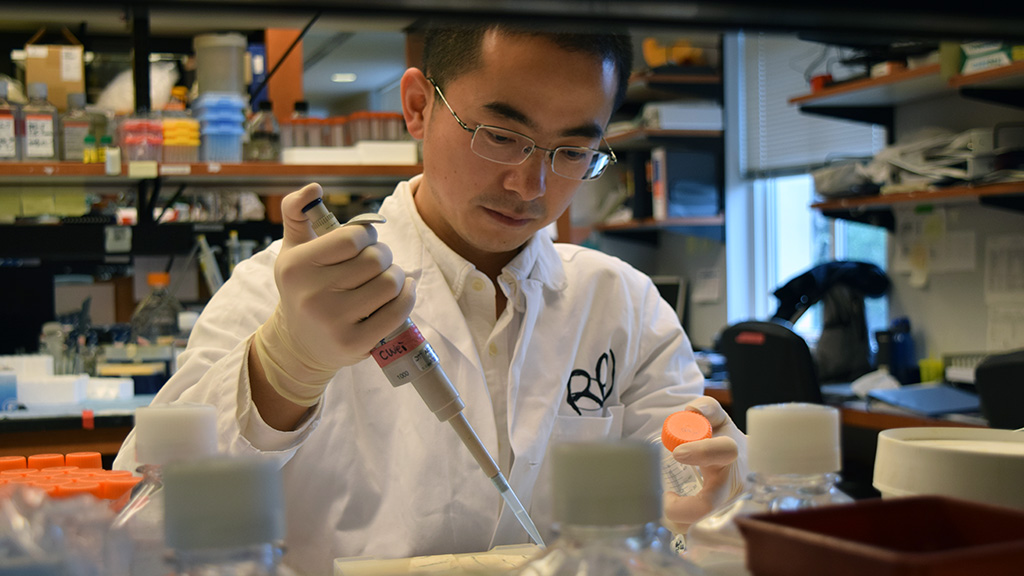Uncovering cell death mechanisms through Bcl2 family
The Deng laboratory is committed to understanding how the Bcl2 family, ribonucleotide reductase (RNR), and KRAS regulate apoptosis, DNA replication stress and DNA repair, which contributes to tumor development and cancer therapeutics.
The major research interests of the Deng laboratory are to uncover cell death mechanisms through the Bcl2 family members (i.e. Bcl2, Bcl-XL, Mcl-1, Bax, Bak, etc.), to investigate molecular and signaling mechanisms of DNA replication stress, DNA repair, genomic instability and carcinogenesis, and to discover novel small molecule anti-cancer agents for treatment of cancers by targeting apoptosis, DNA replication stress and DNA repair signaling pathways. Despite significant advances in immunotherapy, many cancers have primary or acquired resistance to immunotherapy. The Deng laboratory also develops strategies to overcome immunotherapy resistance by targeting PD-L1 signaling pathways. Additionally, the Deng laboratory investigates environmental carcinogenesis, specifically mechanisms of tobacco smoke- or space radiation-induced DNA damage, replication stress and tumorigenesis. These studies will significantly contribute to the development of new agents and strategies for cancer therapies. To achieve this, three major research directions are highlighted below:
Role and mechanism of Bcl2 family in regulating apoptosis, DNA replication stress, DNA repair, and carcinogenesis
The decision phase of apoptosis is mainly regulated by the Bcl2 family that is composed of antiapoptotic (i.e. Bcl2, Bcl-XL, Bcl-w, Mcl-1, etc.) and proapoptotic (i.e. Bax, Bak, Bad, Bim, Bid, PUMA, etc.) members. The Bcl2 family members have homology clustered within four conserved Bcl2 homology (BH) domains: BH1, BH2, BH3, and BH4. The BH1, BH2, and BH3 domains form the surface binding pocket of Bcl2 that mediates protein-protein interactions (PPI) within Bcl2 family members or between Bcl2 family and other molecules (i.e. SUFU, KU, MRE11, etc.) for regulation of apoptosis or other cellular functions, respectively. We discovered that Bcl2, in addition to its survival function, also suppresses the repair of abasic sites of DNA lesions and DNA double-strand breaks (DSBs), which leads to accumulation of DNA damage in living cells and increased genetic instability. Intriguingly, expression of Bcl2 results in decreases in RNR activity and intracellular dNTP, retardation of DNA replication fork progression, and increased rate of fork asymmetry, leading to DNA replication stress. Bcl2-induced DNA replication stress promotes lung carcinogenesis in response to space radiation. In addition to Bcl-2, the roles of other Bcl2 family members (i.e. Mcl-1, Bcl-XL, Bax, etc.) in regulation of DNA replication stress, DNA damage response, DNA repair, senescence, autophagy and immune response are currently under investigation.
Modulation of DNA replication stress for cancer therapy
DNA replication stress (RS) is an inefficient DNA synthesis process that leads replication forks to progress slowly or stall. Importantly, RS is a hallmark of cancer, resulting from deregulation of DNA replication. Cancer cells have a continuous and high degree of RS, thus, targeting RS may have selectivity in killing cancer cells, which is an attractive strategy for cancer therapy. Ribonucleotide reductase (RNR), containing regulatory RRM1 and catalytic RRM2 subunits, is the enzyme that catalyzes the conversion of ribonucleoside diphosphates to deoxyribonucleoside diphosphates and thereby provides dNTP precursors needed for the synthesis of DNA. We have recently discovered that acetylation of RRM2 at K95 results in the reduction of the dNTP pool, DNA replication fork stalling, and the suppression of tumor cell growth in vitro and in vivo. We are currently focused on understanding how to directly modulate RNR acetylation for lung cancer therapeutics.
Discovery of novel small molecules targeting Bcl-2 family, KRAS, and ribonucleotide reductase for cancer therapy
Most patients with lung cancer have poor prognosis due to treatment resistance. Therefore, the development of more effective, novel drugs that act through basic molecular mechanisms to overcome resistance is critical to improving the prognosis of patients with lung cancer. We have recently discovered several novel small molecule anti-cancer agents by specifically targeting Bcl-XL (BXI-61 and BXI-72), Bcl2 BH4 domain (BDA-366), Mcl-1 (MI-223), Bax (SMBAs and CYD-2-11), Mcl-1/Akt signaling (PH-687) and KRAS (KRA-533) for treatment of both small cell lung cancer (SCLC) and NSCLC. KRA-533 offers a potentially effective strategy for the treatment of lung cancers with KRAS mutations and/or mutant KRAS-driven lung cancer. We will continue to explore the discovery of new small molecule anti-cancer agents by targeting novel protein-protein interactions (PPI) or novel function domain(s) in Bcl2 family members, mutant KRAS, ribonucleotide reductase and PD-L1.


